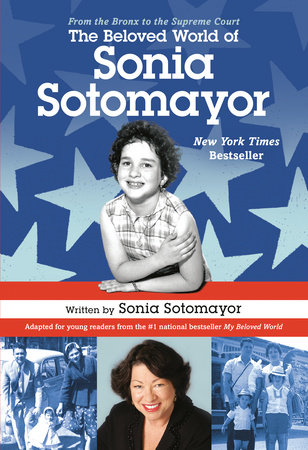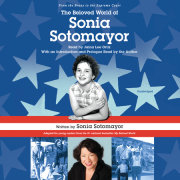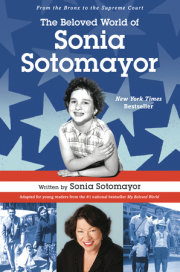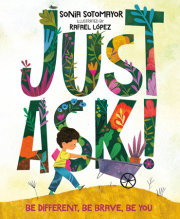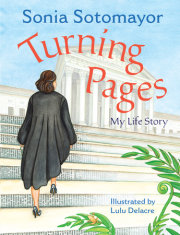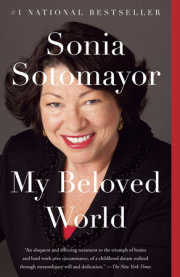One
The world that I was born into was a tiny microcosm of Hispanic New York City. A tight few blocks in the South Bronx bounded the lives of my extended family: my grandmother, matriarch of the tribe, and her second husband, Gallego, her daughters and sons. My playmates were my cousins. We spoke Spanish at home, and many in my family spoke virtually no English. My parents had both come to New York from Puerto Rico in 1944, my mother, Celina Baez, in the Women’s Army Corps, my father, Juan Luís Sotomayor, with his family in search of work as part of a huge migration from the island, driven by economic hardship.
My brother, now Juan Luis Sotomayor Jr., MD, but to me forever Junior, was born three years after I was. I found him a nuisance as only a little brother can be, following me everywhere, mimicking my every gesture, eavesdropping on every conversation. In retrospect, he was actually a quiet child who made few demands on anyone’s attention. My mother always said that compared with me, caring for Junior was like taking a vacation. Once, when he was still tiny and I wasn’t much bigger, my exasperation with him inspired me to lead him into the hallway outside the apartment and shut the door. I don’t know how much later it was that my mother found him, sitting right where I’d left him, sucking his thumb. But I do know I got walloped that day.
But that was just domestic politics. On the playground, or once he started school at Blessed Sacrament with me, I watched out for him, and any bully thinking of messing with him would have to mix it up with me first. If I got beat up on Junior’s account, I would settle things with him later, but no one was going to lay a hand on him except me.
Around the time that Junior was born, we moved to a newly constructed public housing project in Soundview, just a ten-minute drive from our old neighborhood. The Bronxdale Houses sprawled over three large city blocks: twenty-eight buildings, each seven stories tall with eight apartments to a floor. My mother saw the projects as a safer, cleaner, brighter alternative to the decaying tenement where we had lived. My grandmother Abuelita, however, saw this move as a venture into far and alien territory, el jurutungo viejo for all practical purposes. My mother should never have made us move, she said, because in the old neighborhood there was life on the streets and family nearby; in the projects we were isolated.
I knew well enough that we were isolated, but that condition had more to do with my father’s drinking and the shame attached to it. It constrained our lives as far back as my memory reaches. We almost never had visitors. My cousins never spent the night at our home as I did at theirs. Even Ana, my mother’s best friend, never came over, though she lived in the projects too, in the building kitty-corner from ours, and took care of my brother, Junior, and me after school. We always went to her place, never the other way around.
The only exception to this rule was Alfred. Alfred was my first cousin--the son of my mother’s sister, Titi Aurora. And just as Titi Aurora was much older than Mami, and more of a mother to her than a sister, Alfred, being sixteen years older than I, acted more as an uncle to me than a cousin. Sometimes my father would ask Alfred to bring him a bottle from the liquor store. We counted on Alfred a lot, in part because my father avoided driving. This annoyed me, as it clearly contributed to our isolation--and what’s the point of having a car if you never drive it? I didn’t understand until I was older that his drinking was probably the reason.
My father would cook dinner when he got home from work; he was an excellent cook and could re-create from memory any new dish he encountered, as well as the Puerto Rican standards he no doubt picked up in Abuelita’s kitchen. I loved every dish he made without exception, even his liver and onions, which Junior hated and shoveled over to me when Papi’s back was turned. But as soon as dinner was over, the dishes still piled in the sink, he would shut himself in the bedroom. We wouldn’t see him again until he came out to tell us to get ready for bed. It was just Junior and I every night, doing homework and not much else. Junior wasn’t much of a conversationalist yet. Eventually, we got a television, which helped to fill the silence.
My mother’s way of coping was to avoid being at home with my father. She worked the night shift as a practical nurse at Prospect Hospital and often on weekends, too. When she wasn’t working, she would drop us off at Abuelita’s or sometimes at her sister Aurora’s apartment and then disappear for hours with another of my aunts. Even though my mother and I shared the same bed every night (Junior slept in the other room with Papi), she might as well have been a log, lying there with her back to me. My father’s neglect made me sad, but I intuitively understood that he could not help himself; my mother’s neglect made me angry at her. She was beautiful, always elegantly dressed, seemingly strong and decisive. She was the one who moved us to the projects. Unlike my aunts, she chose to work. She was the one who insisted we go to Catholic school. Unfairly perhaps, I expected more from her.
However much was said at home, and loudly, much also went unsaid, and in that atmosphere I was a watchful child constantly scanning the adults for cues and listening in on their conversations. My sense of security depended on what information I could glean, any clue dropped inadvertently when they didn’t realize a child was paying attention. My aunts and my mother would gather in Abuelita’s kitchen, drinking coffee and gossiping. “¡No me molestes! Go play in the other room now,” an aunt would say, shooing me away, but I overheard much regardless: how my father had broken the lock on Titi Gloria’s liquor cabinet, ruining her favorite piece of furniture; how whenever Junior and I slept over with our cousins, my father would phone every fifteen minutes all night long, asking, “Did you feed them? Did you give them a bath?”
When my mother wasn’t present, the gossip would take a familiar turn, my grandmother saying something like “Maybe if Celina ever came home, he wouldn’t be drinking every night. If those kids had a mother who ever cooked a meal, Juli wouldn’t be worrying about them all night.” As much as I adored Abuelita--and no one resented my mother’s absence more than I did--I couldn’t bear this constant blaming. And often my mother’s efforts to please Abuelita--whether a generously chosen gift or her ready services as a nurse--went dimly acknowledged. Even being Abuelita’s favorite, I felt exposed and unmoored when she criticized my mother, whom I struggled to understand and forgive myself.
One overheard conversation had a lasting effect, though I now remember it only vaguely. My father was sick: he had passed out, and Mami took him to the hospital. Tio Vitin and Tio Benny came to get Junior and me, and they were talking in the elevator about how our home was a pigsty, with dishes in the sink and no toilet paper. They spoke as if we weren’t there. When I realized what they were saying, my stomach lurched with shame. After that I washed the dishes every night, even the pots and pans, as soon as we finished dinner. I also dusted the living room once a week. Even though no one ever came over, the house was always clean. And when I went shopping with Papi on Fridays, I made sure we bought toilet paper. And milk. More than enough milk.
The biggest fight my parents ever had was because of the milk. At dinnertime, Papi was pouring a glass for me, and his hands were shaking so badly the milk spilled all over the table. I cleaned up the mess, and he tried again with the same result. “Papi, please don’t!” I kept repeating. It was all I could do to keep myself from crying; I was utterly powerless to stop him. “Papi, I don’t want any milk!” But he didn’t stop until the carton was empty. When my mother got home from work later and there was no milk for her coffee, all hell broke loose. Papi was the one who had spilled the milk, but I was the one who felt guilty.
Copyright © 2018 by Sonia Sotomayor. All rights reserved. No part of this excerpt may be reproduced or reprinted without permission in writing from the publisher.

